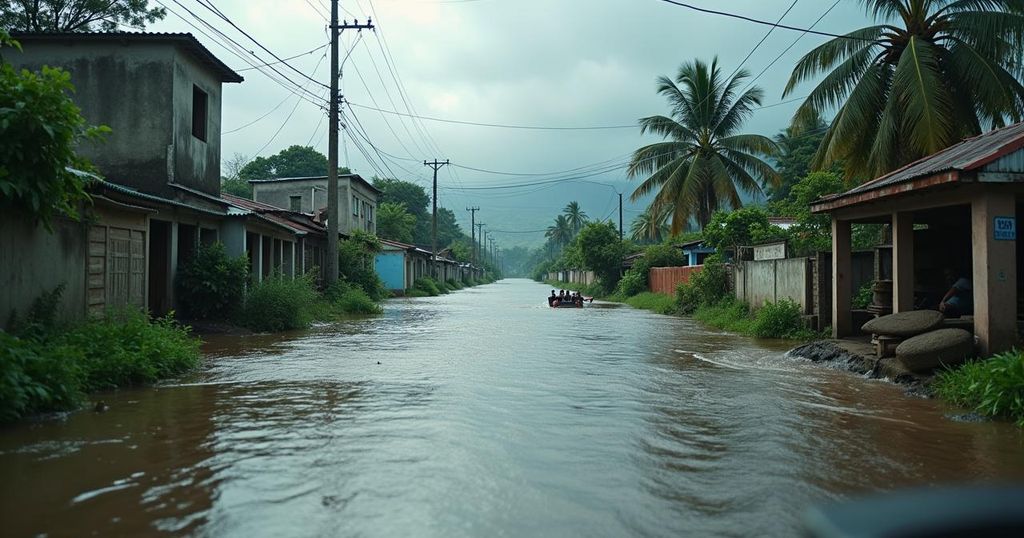Catastrophic Flooding in West and Central Africa: A Humanitarian Crisis Unfolds

Torrential rains have caused catastrophic flooding in West and Central Africa, particularly affecting northeastern Nigeria, with Maiduguri reporting severe damage. Over 400,000 people have been affected, and at least 1,000 fatalities have been recorded in the region. The floods have exacerbated existing humanitarian crises as communities struggle with displacement and loss. Local and international responses are underway, yet many survivors report a lack of adequate support.
In recent weeks, torrential rains have unleashed unprecedented flooding across West and Central Africa, severely impacting northeastern Nigeria particularly hard. On Wednesday, flooding continued to ravage Maiduguri, the capital of Borno state, with the United Nations estimating that more than 400,000 people have been affected. The deluge has resulted in widespread destruction, leaving homes partially submerged, and many people displaced. The devastation is palpable, with alarming reports emerging from Maiduguri, where the floodwaters have assailed the city following a dam collapse. Accounts describe entire neighborhoods being swept away, while alarming images depict crocodile and snake corpses floating amidst human remains. As the floods intensify, authorities have reported over 1,000 fatalities and millions displaced across the region, exacerbating already existing humanitarian crises in countries such as Chad, Mali, Niger, and Nigeria. The UN states that this year has seen a threefold increase in flooding cases when compared to last year, impacting over four million individuals. The ongoing humanitarian crisis reflects Africa’s vulnerability to extreme weather, with the World Meteorological Organization indicating that the continent, despite contributing minimally to global greenhouse gas emissions, faces significant threats from changing climate patterns. In particular, it is estimated that the cost of adapting to such extreme weather is projected to reach between $30-50 billion annually over the next decade in sub-Saharan Africa. Local residents have recounted harrowing experiences as they cope with the aftermath of the floods. Saleh Bukar, a Maiduguri resident, described being alerted in the middle of the night by neighbors shouting, “Water is flooding everywhere!” His statement highlights the panic that has gripped communities as the rising waters have rendered many helpless. Over 600,000 people in Borno state have reportedly been displaced by the floods, with fears of further imminent rainfall complicating rescue efforts. The floods have decimated local infrastructure, including significant damage to dams and key transportation links. Urgently, Governor Babagana Zulum has called for international assistance, stating, “Our resources are stretched to the limit, and we cannot do this alone.” In the face of overwhelming destruction, the World Food Program has initiated efforts to provide food and essentials to those affected, yet many individuals report lacking sufficient state support to recover from this disaster. Survivors like Harira Adamou reflect on their dire circumstances, voicing their struggles to find shelter after their homes were destroyed. Adamou’s efforts to protect her family amid such adversity illustrate the challenges faced by countless individuals across the region. As the situation develops, it remains crucial that international bodies evaluate the depth of ongoing needs and offer meaningful support to those adversely impacted by the floods. As Maiduguri slowly begins to recover, the resilience of its residents shines through. Individuals like Bukar, who assists in rescuing those stranded by the waters, underscore a communal effort to foster solidarity in these trying times. While the rising water levels continue to pose threats, these acts of local heroism may provide some relief amidst the destruction.
This article discusses the severe flooding that has affected West and Central Africa, particularly focusing on the devastation in northeastern Nigeria’s Maiduguri. The context involves environmental changes leading to extreme weather patterns in the region, which has been compounded by existing humanitarian challenges due to ongoing insurgencies and violence. The humanitarian response from both local authorities and international organizations is also highlighted, showing the scale of aid versus the needs on the ground.
The devastating floods in West and Central Africa, especially in Maiduguri, Nigeria, serve as a grim reminder of the challenges posed by climate change, exacerbating humanitarian crises in already vulnerable regions. The urgent calls for international assistance highlight the immediate need for a coordinated response to mitigate the impact on millions displaced and affected. As local communities grapple with loss and destruction, their resilience reflects the human spirit’s determination to endure amidst adversity.
Original Source: apnews.com








